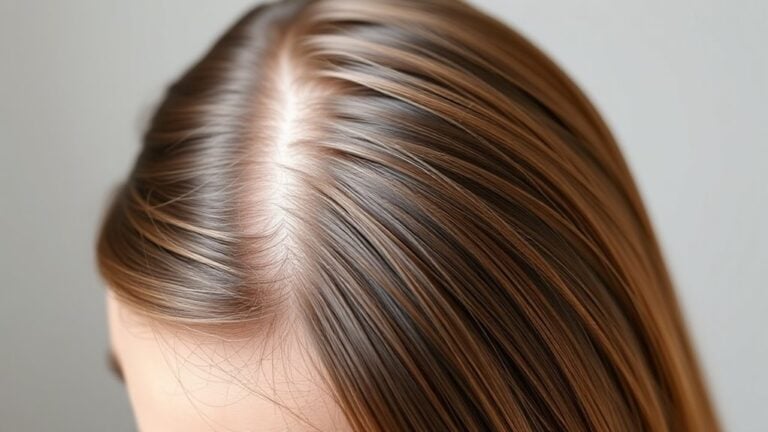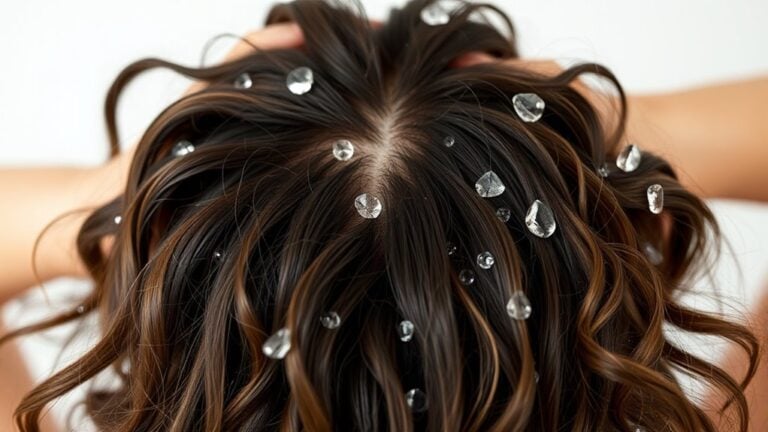Are brittle nails and hair loss causing you concern? These conditions can signal health issues that need addressing. In this article, we explore the causes of brittle nails and hair loss and provide actionable tips to improve your health.
Key Takeaways
- Brittle nails and hair loss can signal underlying health issues and require a holistic approach to management.
- Common causes include nutritional deficiencies, stress, aging, and certain medical conditions, so dietary improvements and stress management are vital.
- Lifestyle changes like quality sleep, avoiding harsh treatments, and using protective measures can significantly enhance hair and nail health.
Brittle Nails and Hair Loss
Brittle nails, or onychoschizia, are characterized by cracking, splitting, peeling, and slow growth. This condition is particularly common in women and can be an early indicator of underlying health issues. Healthy nails should be smooth and strong, but when they become brittle, it often reflects a disruption in our body’s balance.
Hair loss, on the other hand, is when you lose more than 100 strands of hair a day without sufficient new hair growth to replace them. Both hair and nails are part of the integumentary system, which regulates temperature and moisture loss. Therefore, maintaining their health is crucial for our overall well-being.
Understanding these issues allows for better management. Recognizing that brittle nails and hair loss reflect internal health issues encourages a more holistic approach to treatments.
Common Causes of Brittle Nails and Hair Loss
Several factors can lead to brittle nails and hair loss. One primary cause is nutritional deficiency. For instance, low iron levels can significantly impact both hair and nail health, leading to brittleness and loss. Incorporating iron deficiency-fortified foods or supplements can help alleviate these symptoms.
Other common causes include:
- Aging: As we age, the quality of our hair and nails tends to deteriorate, leading to brittleness and slower growth.
- Stress: Psychological stress can cause temporary thinning of hair due to the adverse effects of high cortisol levels.
- Thyroid Disorders: Conditions like hypothyroidism can slow down cell function, resulting in brittle nails and hair loss.
- Family History: Genetics play a significant role, especially in hair loss, where hereditary conditions often worsen with age.
Poor blood circulation from conditions like Raynaud’s syndrome can also adversely affect nail health, causing brittleness. It’s essential to consider external factors as well. Certain hairstyles that apply tension to hair shafts can cause traction alopecia, a specific type of hair loss. Similarly, frequent use of nail polish and artificial nails can weaken nails over time.
Understanding these causes helps us take proactive steps to mitigate the effects, whether through dietary changes, stress management, or avoiding harsh treatments.
Identifying Symptoms
Early identification of symptoms is key to managing brittle nails and hair loss. Brittle nails might exhibit cracking, roughness, pitting, softness, dryness, discoloration, chipping, and slow growth, signaling that they need attention.
Hair loss symptoms are equally important to recognize. They can manifest as patchy bald spots, hair thinning on the scalp, or excessive hair shedding during washing or brushing.
Key symptoms to watch for include:
- Nails: Cracking, roughness, pitting, softness, dryness, discoloration, chipping, slow growth.
- Hair: Patchy bald spots, thinning hair on the scalp, increased hair shedding.
Recognizing these symptoms helps in finding appropriate treatments and making lifestyle changes to enhance hair and nail health.
Nutritional Solutions for Healthy Hair and Nails
Maintaining a balanced diet is essential for healthy hair and nails. Biotin, for instance, aids in metabolizing amino acids and maintaining their health, with daily supplementation improving nail health over time. Folic acid supports hair growth and nail repair by promoting cell production.
Key nutrients include:
- Protein and Iron: Essential for rebuilding and strengthening hair and nails as they are fundamental for keratin production.
- Zinc: Important for hair growth and repair, as well as maintaining nail integrity.
- Vitamin A: Crucial for sebum production, keeping hair moisturized.
- Vitamin D: Deficiency can lead to hair loss and weakened nails.
- Omega-3 Fatty Acids: Contribute to hydration, preventing brittleness.
Effective Treatments for Brittle Nails
Frequent hand washing can dry out nails, leading to brittleness. Avoiding gel manicures, especially during winter, is advisable as they can exacerbate dryness. Instead, consider applying heavy hand cream at bedtime to keep your nails tend moisturized.
Nail slugging, which involves applying a thick layer of petroleum jelly over your nails, can enhance moisture retention. Keeping your nails clipped or filed can also prevent them from breaking.
Incorporating these treatments into your routine can significantly improve nail health and reduce brittleness.
Managing Hair Loss
Effective management of hair loss combines gentle hair care practices with professional advice. Here are some tips to consider:
- Use a gentle shampoo to help prevent moisture loss from thinning hair.
- Follow up with a moisturizing conditioner to minimize breakage.
- Consider using leave-in conditioners or detanglers to further reduce hair breakage and split ends.
By incorporating these practices, you can help maintain the health of your strong and healthy hair.
It’s advisable to avoid hot-oil treatments and limit the use of heat styling tools, as they can weaken the hair. Hormonal fluctuations during pregnancy, childbirth, or menopause can lead to either temporary or permanent hair loss.
A dermatologist can offer personalized strategies for managing conditions like alopecia, making their consultation crucial for addressing hair loss.
Lifestyle Changes to Support Nail and Hair Health
Lifestyle changes can greatly support nail and hair health. Stress management techniques are beneficial since high cortisol levels from stress can negatively affect hair growth and nail health. Quality sleep is also linked to healthier hair, skin, and nails.
Limiting alcohol intake is crucial as excessive consumption can lead to dry hair and brittle hair, as well as contribute to hair loss. Additionally, wearing gloves while washing dishes and using household cleaners can protect your nails from harsh chemicals.
These lifestyle changes can lead to noticeable improvements in hair and nail health.
When to Consult a Doctor
Persistent or severe symptoms of brittle nails and hair loss warrant medical advice, as they may indicate underlying medical conditions needing professional assessment.
Noticing changes in your nails, like yellowing or thickening, should prompt a consultation with a dermatologist. Regular check-ups with a healthcare professional can help manage and address ongoing health issues effectively.
Timely consultation with a doctor provides a clear diagnosis and a tailored treatment plan.





